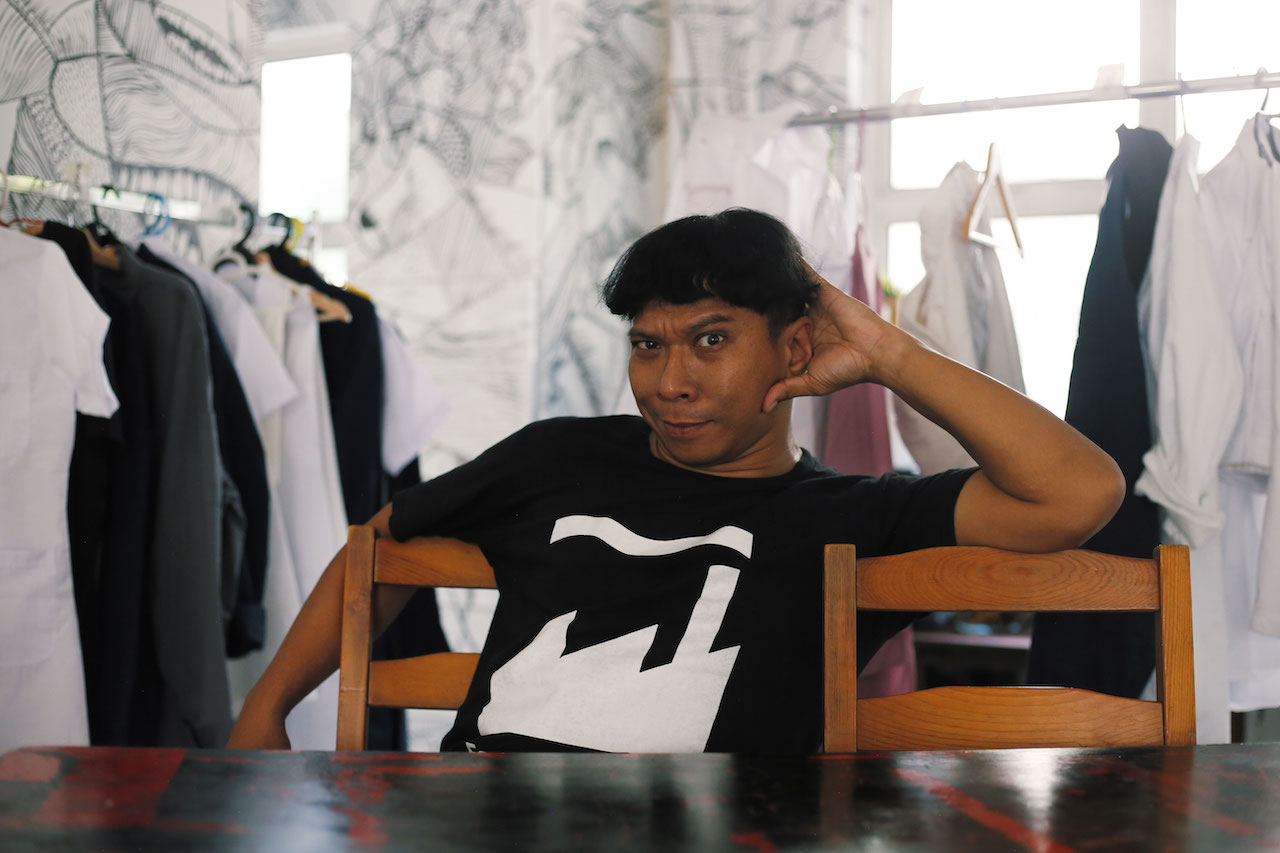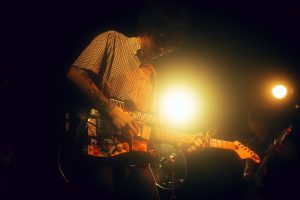If you type ‘Rizman Putra’ into the Google search bar, the first result is a picture of him lying on the floor, dressed as a tissue packet. It looks like a gallery opening of the Moet and hors d’ oeuvres variety. Well-dressed people are milling around, but with pained expressions because they don’t know whether to laugh, or to nod sagely at the tissue-man parked at their feet. Their tight-lipped faces seem to say: Is this Avant-Garde theatre, or some kind of prank?
This photograph was taken at an exhibition at the Singapore Embassy in Paris, and it received 13,400 shares when Mothership re-posted it a few hours later. Rizman, however, insists that he did not set out to achieve virality. The curator, Mr Imran Ismail, had invited him to be part of the art show. Perhaps unwisely, he also told Rizman over the phone that the exhibition’s ‘theme’ would be C(hope).
“Okay, I told him, I’m going to come as a tissue packet,” Mr Rizman replied.
Thinking it was some kind of joke, the curator rang off. A few months later, he learnt that Rizman meant it quite literally, but it was too late to dissuade him or to sow the seeds of self-doubt by asking, “Are you sure?” As a result, Singaporean Embassy staff spent an (long) evening explaining to their French counterparts what a hawker centre is and how one might reserve a place with paper napkins.
That was part of the act, Rizman explains, quite seriously.
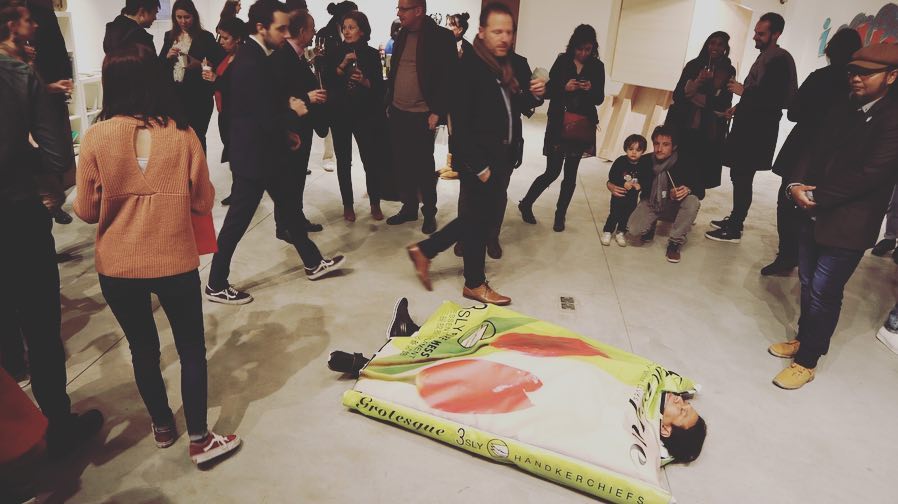
For a man who has played the role of tissue packet, condom, boxer, Badang, carrot, ghost, genie, Care Bear, and the Bukit Timah Monkey Man, Rizman Putra is surprisingly reserved. When I met him at Teater Ekamatra’s offices, he looked a little tired. We shook hands formally and wandered downstairs for a cigarette. It’s been a long week, he confessed, and the rehearsals for A Clockwork Orange were exhausting.
Recalling Stanley Kubrick’s high-octane movie (and Youtube interviews of actors discussing their craft), I ask if his role as Alex had been physically demanding.
He replied in the negative: “Physically, no; mentally, yes”. Clockwork is a violent story, and he did not enjoy beating his colleagues, or getting spat upon.
However, when it came time for the photo shoot, things perked up and took a turn for the hilarious. Dressed as Alex, he danced out from the changing room in white shorts and struck a pose that could only be described as ‘Perfume Ad Supermodel’.
I’ve heard short actors (Judi Dench on Desert Island Discs) boast that they could play tall, statuesque blondes, but I’ve never witnessed it. But here it was, at last: a muscular Malay dude with a bowl cut giving off the languid, post-coital air of an anorexic Vogue model. Milan Fashion Week had come to Aliwal Street. All of us—Teater Ekamatra and RICE staff—tried not to laugh but it was a losing battle. Teater Ekamatra’s Associate Artist, Munah Bagharib, was the first to whip out her phone but the trickle quickly turned into a flood. Before long, everyone was snapping shots of Supermodel Rizman for their Instagram feeds while giving each other stupid, happy grins.
Given how quickly he got ‘into character’, one might be forgiven for thinking that Rizman is a natural performer. The Class Clown. A Drama Kid. One of those extroverts who revel in attention. This could not be further from the truth. As Rizman tells it, he was—is—a shy person, and growing up, he had “no fucking clue what to do with his life”.
In primary school, he was dragged into choir by his form teacher who needed manpower in the baritone section. (”we got gold at SYF”). In secondary school, he bounced from one CCA to another, because he was a ‘weird kid’ who wanted to be part of something, anything. Dikir Barat was full of ‘alpha’ Malay guys and he wasn’t good enough for soccer. Uniform groups did not appeal either, so he ended up with the geeks—as Hockey Captain.
I protest, but Rizman insists that Hockey was ‘not a cool sport’. It was full of nerds. In any case, he couldn’t play Hockey for nuts and the team frequently got thrashed 13-0 when the inter-school competitions came around.
“They picked me mostly because I could run very fast,” he said.
In addition to Hockey, he also had a few ‘unofficial’ CCAs which were not sanctioned by MOE. The 1990s, as he tells it, was the era of Street corner gangs with appropriately 90s names like ‘Gun N Roses’ and the ‘San Francisco 49ers’. There were frequent fights outside the school and Rizman would skip class to join—as an audience member.
“I wasn’t part of the gang, but I wanted to go and support my friend who was fighting,” he explains.
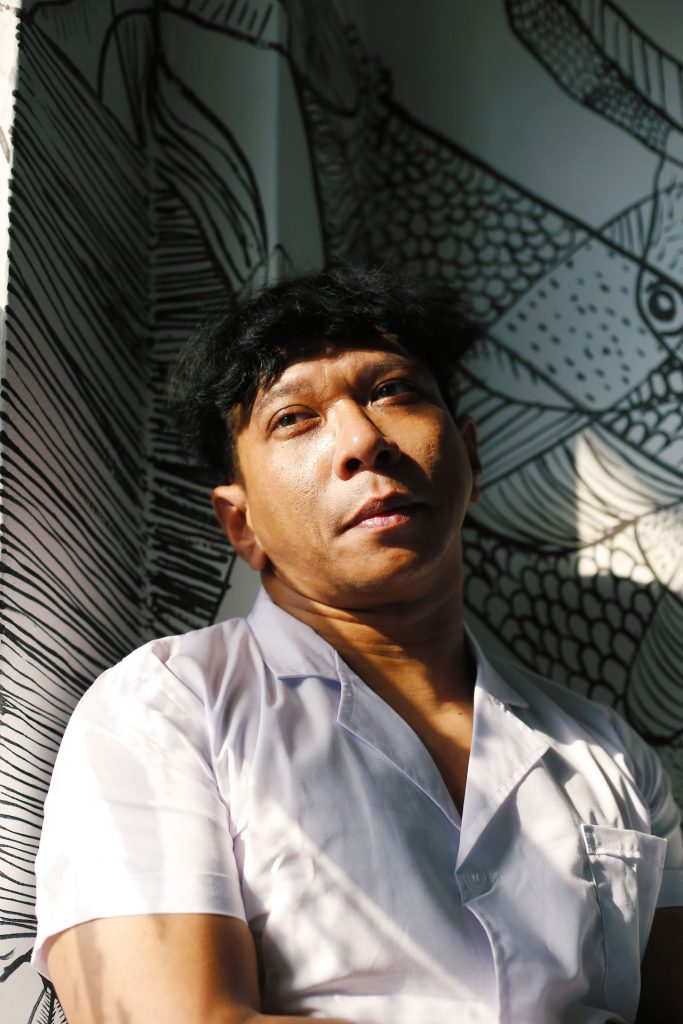
Barred from playing with the neighborhood kids because he lived in a rough neighbourhood of “glue-sniffers and molesters” (Bukit Merah), he and his siblings—one older brother and one younger sister—mostly stuck with television and their own make-believe games. The two activities were not always separate. Television would fuel his imagination, and after watching, the siblings would turn the bed into a wrestling ring whilst the sofa was remade into a boat on the high seas. The siblings watched Richard Simmons, Jane Fonda, P. Ramly, The Electric Company (starring a young Morgan Freeman), but his favorite was Michael Jackson.
Rizman and his brother were so obsessed with MJ that they memorised the entire Thriller choreography down to the hand movements. Their mother, impressed by their dedication, bought Rizman a pair of MJ silver sequin gloves.
Rizman credits this intensely restrictive childhood for his later arts career. Not being able to play outside was perhaps a blessing in disguise, because it forced him to create stories in his head.
“Television is a friend. Even today, many of my ideas came from watching TV in the 1980s,” he says.
Back in the 1990s, all of this happened in the privacy of home. After getting his ‘O’ levels, he was still lost and confused. He could do Business or Engineering at Polytechnic, but he wasn’t really interested. He had a notion of doing something artsy, but he didn’t make up his mind until he walked past the school one day.
As Rizman recalls, it was their hair-styling that finally convinced him.
“One day, at the bus stop, I saw all these Lasalle kids with long shoulder-length hair. I thought: ‘Lasalle is cool because you can I have long hair. I thought, okay, I want to join them,’” he remembers.
His mother was skeptical but supportive. Having witnessed her son’s -uh- eccentricities, she had an inkling that Rizman could not be shackled to a desk. She agreed to art school, on the condition that Rizman pay his own way.
Rizman arrived at Lasalle and blossomed from couch potato into thespian. At Lasalle, he discovered his love of performance and took to the stage like a duck to water, starring in countless plays, winning many awards, and taking his first steps as an actor.
This description would look great on the Lasalle admissions brochure—but it didn’t happen. On the contrary, Rizman hated the so-called theatre kids who were ‘super-loud’ and ‘noisy’. Like every introverted painting major, 17-year-old Rizman thought himself a ‘sensitive soul’, who just wanted a ‘lonely space’ for himself.
“I didn’t want to hang out. I didn’t want to socialise. Just want to paint,” he said.
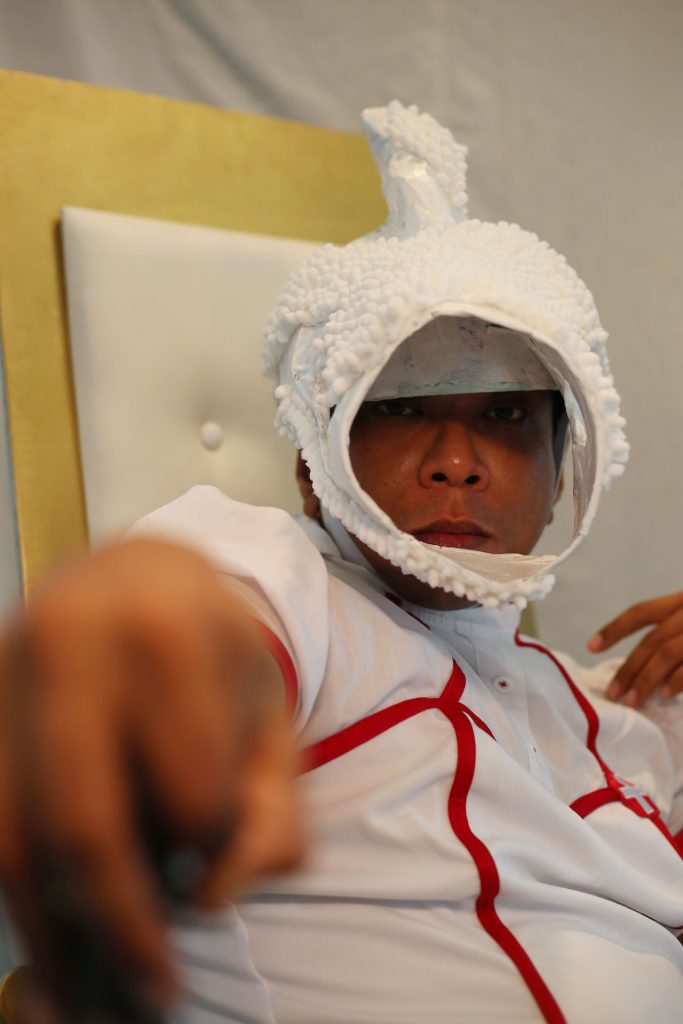
As Rizman tells it, this break-up sent him “into the deep end”. Like many NSFs before him, he became depressed by this cocktail of heartbreak and the unfamiliar regimental environment.
It was at this point, however, that he began to perform. Or rather, Rizman decided ‘to do everything’—including performance. Literally everything from dancing to miming to busking.
Together with friends from Lasalle, he formed a collective at the Substation which put on performance art pieces. The spoken word artist Susie Linham asked Rizman to translate her words into movement and he agreed, moving as she recited. This caught the attention of Daniel Kay, who then invited him to join his modern dance group, and TheatreWorks Director Ong Keng Sen, who recruited Rizman onto his stage despite his lack of experience.
It was the deep end, but in a different way.
“They gave us three months to devise the show. Me being a fine arts major, I didn’t even know what devise meant,” he recalls.
He didn’t have much dancing experience either, and lost amidst a flock of professional dancers, he had to learn how to stretch and plié It was not an easy experience, and Rizman recalls being nervous and terrified, but also entranced by the experience. The act of performing, of becoming someone else, helped him to forget other troubles. It helped him to cope with the unhappiness of heartbreak, and he subsequently threw himself into it with unmatched fervour.
“When I perform, I’m not Rizman anymore. I’m not Rizman anymore. It’s the other,” he explains, “It’s like releasing your energy. It’s like catharsis.”
In camp, he painted what he calls ‘propaganda murals’ and posters for the regiment. Come book out time, he would shed his uniform to become a young artist par excellence.
To supplement his income, he also took a gig as a dancer for Zouk. Dressed in various mascot costumes (care bear, genie, condom, carrot), he would dance in line and inside the club to hype up the crowd, who need a little encouragement to approach the dance floor.
Rizman took this job “because National Service paid you peanuts”, but in the end, it would leave one indelible mark on his career as an artist.
One evening, at the Artist Village, where he had put up a video installation, the equipment failed. The manager called Rizman in a state of panic and told him: “Can you perform? You have to perform! We can’t play your video.”
Rizman demurred because he had literally a few hours to come up with something. Thinking on his feet, he went to the Zouk dressing room and “borrowed” a purple leotard.
At the village, he transformed into ‘Manic Jango’, a superhero who ‘can’t even save himself’. A 3-in-one instant coffee salesman by day, and a superhero by night, Manic Jango would rip off his work clothes to reveal a purple leotard—his batsuit. Rizman, for his part, went so far as to walk across Armenian street still in character as Mr. Jango, stopping traffic along the way and getting honked at.
It was the first of his many personas, and Armenian street would prove to be a rubicon of sorts for Rizman’s career. Manic Jango became Rizman’s ‘stage moniker’ and his Instagram handle.
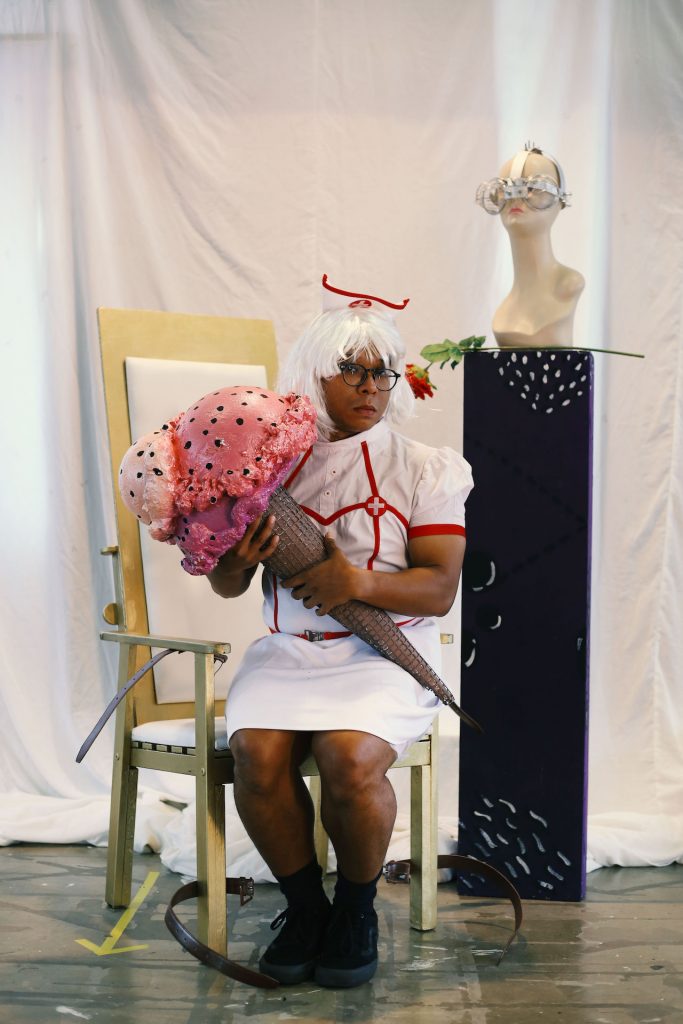
This year, Rizman Putra is 41 years old. He claims that age has taken a toll on his body (”You don’t recover quickly like before”), but this statement is not supported by the facts. Just 3 years ago, in the 2016 National Day Parade, he played Badang, a Malay hero who gained great strength by eating the vomit of a genie—and even greater renown for hurling the Singapore Stone. The role needed an actor who could perform whilst soaring 30m above ground like a trapeze artist, and Rizman acquiesced. (”The moment she said, you were going to fly around, I said okay”)
To prepare, he spent 3 days a week training with the Commandos at Hendon Camp, where they worked his abdominal muscles until felt things in his groin that no man should ever have to feel.
“It’s not easy you know, all the time I was there. The main thing on my mind was, “Control. Control. Control. Don’t break character. Control,” he recalled.
Teater Ekamatra’s space, Greymatter, stands as another testament to his passion and his unwavering core strength. From floor to ceiling, they are covered with black and white murals of Rizman’s design.
Snarling Francis Bacon motifs. Strange phallic shapes. Lines that twist, meander, and converge on themselves. Rizman painted them over the course of 21 days (”I had some help from assistants”), arriving at 7 AM in the morning and leaving as late as 11 PM at night. Of the experience, he says, with his self-effacing humour: “I was like, fuuuuuck man, why I do this to myself.”
It’s been at least a decade since he last picked up a paintbrush, so I ask him the obvious question: Why the sudden return to your roots?
Rizman half-jokingly calls painting his retirement strategy—for when he needs a cane and cannot act or dance anymore. For the time being, however, it is the solitude he enjoys.
“As you grow older,” he said, “You don’t want to be part of anything. It’s like going back to your shell. Some projects, you can just feel the bad ju-ju.”
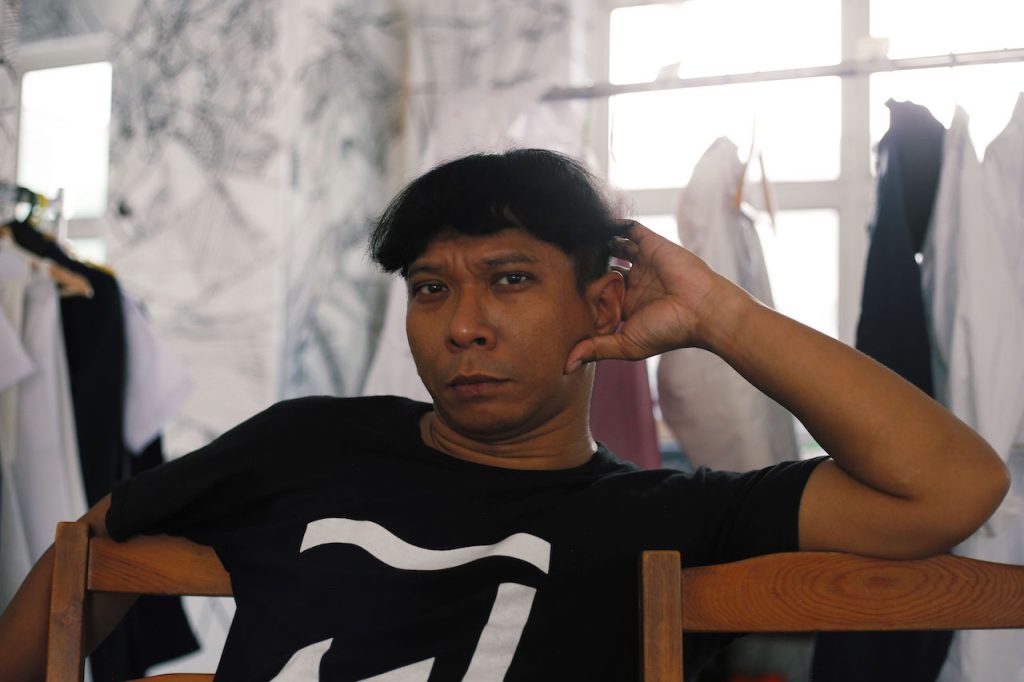
It’s almost 6.30 PM and he needed to do a voice-over for A Clockwork Orange, so we began tying up loose-ends. What’s next for you, I ask, switching off my phone and packing up.
It was a throwaway question. A generic ending. A chance for the subject to plug any upcoming projects. To my surprise, he gazes towards the ceiling, pauses thoughtfully and wags one imperious finger.
“I would like … to be the National Day Parade Commander,” he replies, quite sternly, before breaking into another grin. I am so taken aback, I forget to start the voice recorder, but Rizman is already excitedly describing his vision for an alternative National Day Parade. It won’t be at the Marina Bay or the Padang, there will be no fireworks and the SAF can take a day off.
“And our MPs?” I ask.
“We will put them somewhere else for that day,” he said, seemingly unafraid of blasphemy.
“Every year it’s the same, you know. Don’t you find it boring? I want something different, something weird for a change.”

